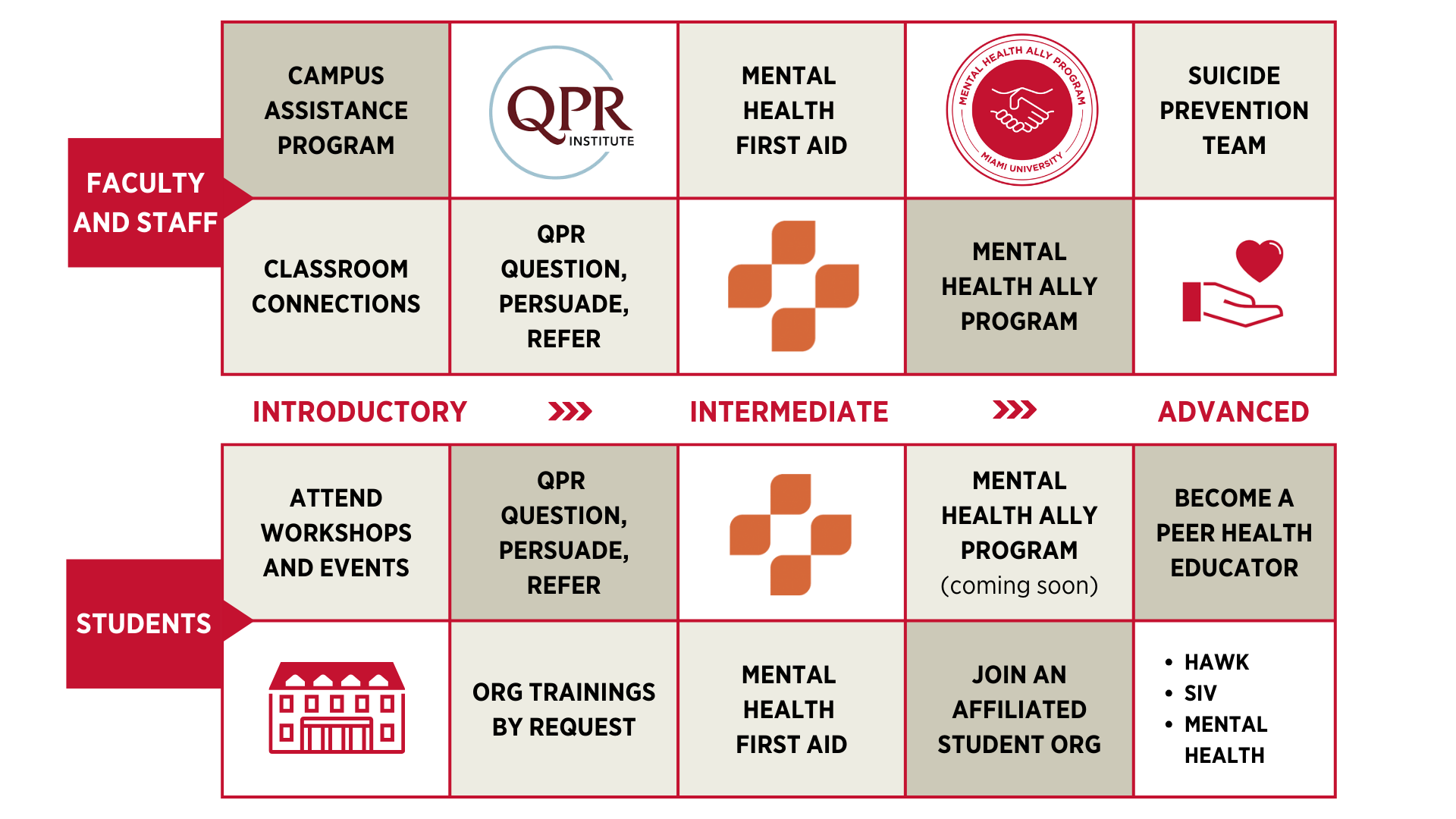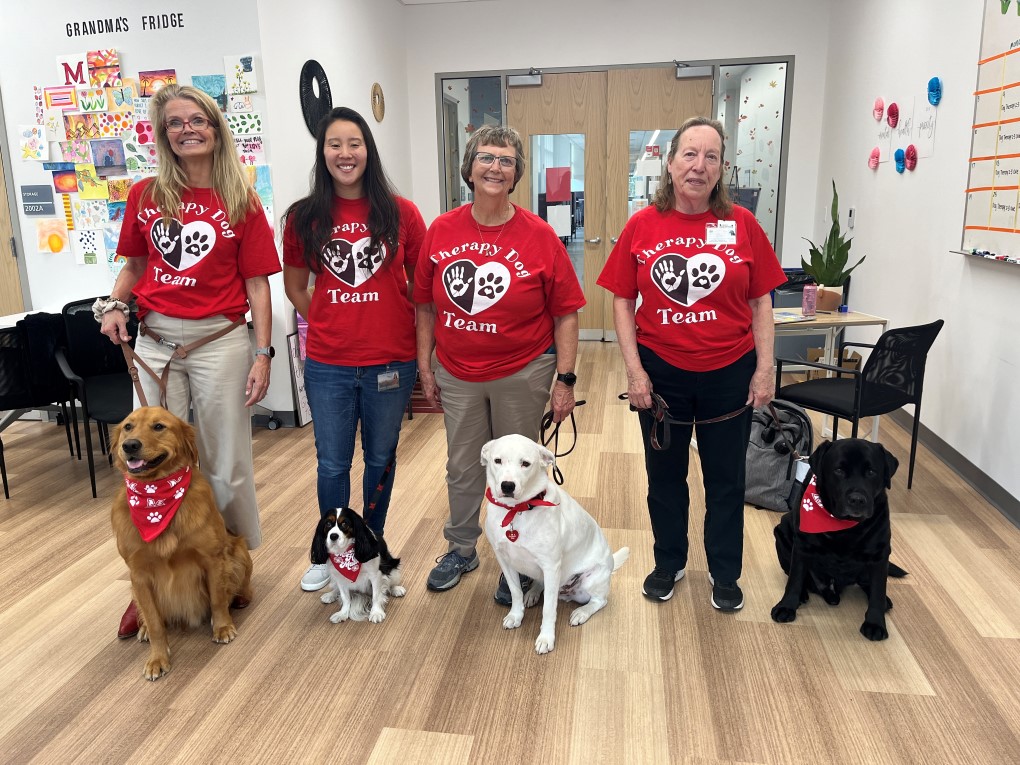Helping the helpers: Training programs build confidence and competence in mental health support
Miami University’s Student Counseling Service is committed to helping the helpers.
Helping the helpers: Training programs build confidence and competence in mental health support
A professor notices a student who’s suddenly withdrawn and disengaged after a successful first half of the semester. An RA witnesses a resident struggling to manage everyday stress. A fraternity president is concerned a member may have a problem with alcohol. An academic advisor meets with a student who expresses feelings of being overwhelmed, lost, and hopeless.
As a faculty or staff member, as a colleague, as a student leader or friend who wants to help, these moments can feel overwhelming. Should you intervene? How? What is the right thing to say? What resources are available on campus?
Miami University’s Student Counseling Service (SCS) is committed to helping the helpers. Through several training programs, SCS, with the Office of Student Wellness, equips faculty, staff, and students with tools to confidently recognize, intervene, and support individuals facing mental health challenges.
“These programs are about building competence and confidence,” says Laura Wonsik, a clinician with SCS. “They’re designed to empower people to act when it matters most.”
The training opportunities range from introductory to advanced, and there are separate tracks for students and faculty/staff.
“We want to make sure that regardless of your experience, we have a way for you to connect and learn,” said Wonsik.

The Campus Assistance Program (CAP): The first stop for mental health awareness
Audience: Faculty/Staff
Level: Introductory
CAP is a one-hour presentation aimed at faculty and staff, particularly those new to mental health intervention. It covers foundational topics like active listening, distinguishing between manageable and unmanageable discomfort, and recognizing when to refer students to additional resources.
“CAP tries to answer the question of ‘how do we support students who are human beings experiencing the full range of human emotions, without necessarily pathologizing their discomfort?” Wonsik explained. “It’s a good first stop on a mental health ally journey, for those who want to have a conversation but aren’t sure how to start.”
Faculty and staff can request the presentation for meetings or training directly through Wonsik at wonsiklc@MiamiOH.edu.
Classroom connections: Stress less and visible allyship
Audience: Faculty/Staff Instructors
Level: Introductory
The classroom connections program is simple. Instructors sign up, then receive weekly digital wellness content to use in class throughout the term. The content ranges from breathing exercises to mindfulness practices to prompts for creating connection and dialogue. Instructors can also request a pack of free stress less cards to use as prompts as well.
These quick exercises for the classroom are designed to demonstrate visible allyship, while equipping students with practical mental health practices.
“There’s a folder with all the resources available and also a week-by-week guide for a more structured experience,” said Wonsik. “Classroom connections is a great way to show students that you care, as an instructor, about their well-being.”
Faculty and staff can sign up for classroom connections at any time throughout the year.
Question, Persuade, Refer (QPR): Suicide prevention training
Audience: Faculty/Staff and Students
Level: Introductory-Intermediate
QPR is a national 90-minute certificate program focused on suicide prevention. The program teaches participants how to identify the warning signs of a mental health emergency, ask the right questions, and guide individuals toward professional help.
Wonsik likens QPR to CPR, as it’s intended to help save the life of someone in crisis. “The whole idea is around the three steps to prevent suicide: question, persuade, and refer.”
Faculty and staff are encouraged to attend a QPR session offered for free by the student counseling service. Students can request student QPR training through the mental health peer educators in the Office of Student Wellness.
Mental Health First Aid (MHFA): A certification course for mental health response
Audience: Faculty/Staff and Students
Level: Intermediate
Mental health first aid is a global training program that equips participants with skills to identify, understand, and respond to mental health challenges across all stages.
Whereas QPR training focuses on suicidal crises, mental health first aid provides a structured approach to more general mental health issues starting with early signs and including worsening symptoms and crises.
Offered by the student counseling service, the program includes 5.5 hours of interactive training and some pre- and post-course work. Participants become certified upon completion.
“It’s more comprehensive than QPR training,” said Wonsik. “Mental health first aid includes content on substance use issues, panic attacks, psychosis, and more.” The training includes role-playing and practice to learn those intervention skills and feel confident in them.
Faculty and staff can participate for $23.95 (often covered by their department), while students can take the course for free. More information can be found on the Mental Health First Aid website.
Mental health ally program: A cohort of support
Audience: Faculty/Staff and Students (student program is coming soon)
Level: Intermediate-Advanced
Faculty and staff who complete QPR and mental health first aid can apply to become mental health allies. This program includes ongoing hybrid training led by Wonsik and fosters a sense of community among participants.
Currently, 40 mental health allies are active on campus, attending yearly consultations and sharing strategies for supporting students. Allies receive a digital badge for their email signature and resumes and a sticker that visibly identifies them as a source of support.
A student version of the program is coming soon through the Office of Student Wellness.
Affiliated student organizations: Students making change
Audience: Students
Level: Intermediate-Advanced
Students who are interested in deepening their involvement are encouraged to join a student organization affiliated with the Office of Student Wellness. These organizations work closely with the office and are an opportunity for students to coalesce around issues they care about, while impacting peers on these topics.
Like any student organization, the time commitment varies from organization to organization.
Peer health educators: Students supporting students
Audience: Students
Level: Advanced
For students who want to take an active role in supporting their peers, the peer health educator program is an ideal fit. The Office of Student Wellness coordinates three peer health educator positions to provide information, facilitate discussions, and engage classmates in reflection and wellness education.
- HAWKS peer health educators: Focused on equipping students with tools to make informed choices, maintain a healthy lifestyle, and build effective interpersonal skills.
- SIV peer educators: Dedicated to educating peers on sexual violence prevention, healthy relationships, consent, sexual health, and survivor support.
- Mental health peer educators: Specialize in mental health topics, including suicide prevention through QPR training.
Interested students can learn more and apply for a position online.
Suicide Prevention Team: Coordinating campus-wide prevention efforts
Audience: Faculty and Staff
Level: Advanced
The Suicide Prevention Team (SPT), led by the Student Counseling Service, works to educate, inform, and empower the campus community to take action in preventing suicide. The SPT coordinates campus-wide initiatives like suicide prevention week in the fall, stress less week in the spring, faculty research collaboration, and social media campaigns promoting mental health screenings and accessible support resources. The team aims to foster collaboration to ensure a coordinated approach to suicide prevention.
Faculty and staff members who are interested in joining the SPT can sign up on the SPT website.
Open to ideas
The array of training and opportunities to get involved with mental health initiatives reflects Miami’s commitment to fostering a community where members feel supported and empowered to help each other.
“The more well-trained our partners are, the more capacity we all have,” Wonsik says. “It’s a positive ripple effect.”
Wonsik is always open to exploring new ways to support emotional well-being. “If someone is interested in something, I’m here,” she said. “People are welcome to call me, reach out. I’m always willing to do something they need.”
These programs and more can all be found on Miami’s recently launched mental health and well-being website. Introduced in November 2024, the website serves as a centralized hub for mental health resources, including over 125 tools, videos, and services. Its wellness navigator simplifies finding the right support for students, faculty, and staff, ensuring that everyone has access to the help they need.
